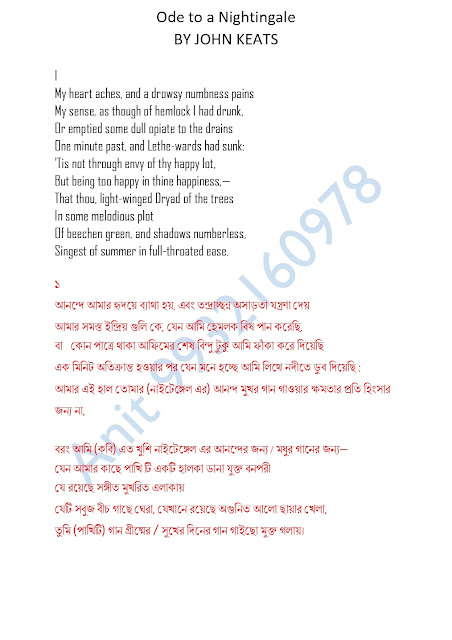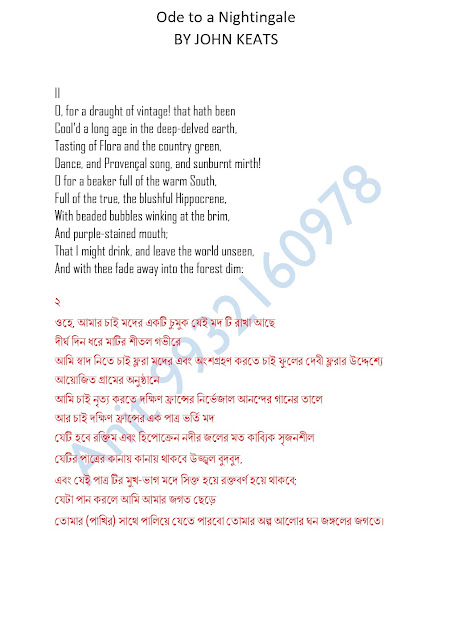Ode To A Nightingale, is a lyric which not only expresses some deeply-felt emotion of the poet but has a rich philosophic interest. Keats had acutely felt the tragedy of human life. He had heard the 'still sad music of human life' as Wordsworth calls it. No doubt, his own life had contributed to this pessimistic outlook. He had lost his brother Tom. His own health too had been failing. The bitter attack of the reviewers, the uncertainty of his love-affair with Fanny Brawne had bred in him a mood of melancholy. All this has darkened his view of life, to which he gives such concentrated expression in the third stanza of the poem. In this mood of mind the poet had one day heard the song of a nightingale singing in a garden. He found in the song a symbol of joy and happiness. The song fills him with a desire to escape from the hard reality of life into the world of love and beauty, visions of which were opened before his eyes by the song of the bird. He knows that the bird is free from the ills of life - 'which thou amongst the trees hast never known. That is why he sings such ecstatic song. The poet would share the joy of life, 'fade away and dissolve in the life of the bird. At first he thinks of the help of wine to carry him into that world. But soon the thought is dismissed and he would fly on the viewless wings of poetry. His imagination has caught fire. It has already transported him to the forest of the bird. Indeed, his joy is so great that he longs to die in the midst of joy and can not bear the idea of the joy coming to an end. In his imagination he immortalises the bird and finds in it a symbol of permanent joy and beauty. In the midst of such high thoughts, reality of life, sorrow of life come back to his life once again with a sharp grief. The poet hints here also the limitation of human imagination which cannot deceive for long. He feels that reality is stronger than fancy and he is left in doubt if he was waking or sleeping so long.
Keats is a great romantic poet. His poetry is soaked in the beauty of the earth and at the same time in rich with the imaginative beauty of the ideal world that he conjures up. The main theme of the poem is the contrast between the sordidness of the reality and the beauty of the ideal world, between the mortality of life and immortality of Nature, between the imperfections of real life and the beauty of imagination. Ode to a Nightingale turns on the theme of the contrast between the real and the ideal. The poet gives a vivid picture of reality that oppresses his mind and spirit in the third stanza. It is full of "fever and fret and weariness" - "Here, where men sit and hear each other groan" "where but to think is to be full of sorrow." Here beauty is evanescent and love is transitory. The poet pines to escape from the realities of life which are distasteful to him. In the song of the nightingale, the poet experiences the beauty that lies in Nature. In imagination the poet becomes identified with the bird whose song enchants his sense and imagination.
The poem expresses the mood of despondent contemplation of life. The note of melancholy that runs through the poem is the characteristic note of romantic poetry. This melancholy is born of a sense of imperfection of life. Pressure of reality being too much, the poet seeks escape in the magic of romance as he seeks escape in the magic of eternity in Ode on a Grecian Urn. Keats is, however, no escapist. He escapes from drab reality to higher reality of ideal beauty. He restores reality at a higher point. For him ideal joy and beauty is more real than the evanescent joy and beauty of the real world. Dreams and yearnings are more true than actual living. Keats releases the springs of aspirations and yearnings of men by singing of the ideal beauty symbolised by the song of the nightingale.
The poem exemplifies the romantic qualities of Keats's poetry. The song of the nightingale typifies the very spirit of romance. The song of the nightingale takes the poet from the fret and fever and weariness of earthly life to the romantic world of the nightingale where "the queen moon is on her throne, clustered around by all her starry fays". The poem is highly romantic in suggestion and carries our mind to the mediaeval world of magic casements and perilous seas forlorn. The poet takes delight in the sweety sensuous enjoyment of the melody of the bird. The romantic note of the poem reaches its culmination in the poet's desire for easeful death.
15 Keats is abundantly sensuous. In the 'Ode to a Nightingale', he is steeped in the sensuous enjoyment of the melody of the bird. The joy at the song of the bird had numbed his senses; he feels an aching joy at the joyous song of the bird; he seems to have drunk hemlock; he is gradually sinking to the river of forgetfulness. He wants a beaker full of warm south for flying beside the bird. He enjoys the romantic grove of the bird with all the senses wide awake. He sees the flowers through imagination; he smells their fragrance; he even hears the murmur of the flies round musk rose which is full of 'dewy wine'. Thus from sensations he passes to imagination, but he enjoys the imaginative world with his senses. As the culmination of the sensuous languor, the poet longs for death.
The poem, however, shows Keats's development of mind from sensations to reflection. The poem is deeply meditative. The poet is not content with sensations produced by the melody of the bird. He rises to the height of thought in the contrast between permanence of the beauty of nature and transitoriness of the beauty of life. The human world is imperfect because of the transitoriness of its joy and beauty.
The poem marks Keats's greatness as a poet for the fine felicity of expressions which is almost Shakespearean. Such expressions as "beaded bubble winking at the brim","murmurous haunt of flies on summer eves", "verdurous gloom", clearly testify to Keats's power of expressions. Such lines as "charmed magic casements opening on the foam of perilous seas in fairy lands forlorn" are rich with evocative power. This line is the highest expression of romantic aspiration. Unlike Shelley, Keats is always objective and concrete. He makes magical use of compound expressions for concretising an abstract idea -purple-stained mouth', 'sunburnt mirth', 'leaden-eyed despair. Above all, the rich melodic beauties of the lines make this poem a gem of a lyric. The rich and melancholy strains of the ode induce in the readers a dreamy enjoyment of the song of the bird.













I’m really grateful for your effort in writing such a great post. Read this article. CPS Tester provides accurate click speed results instantly after the test.
ReplyDelete